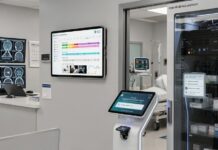St. Jude Medical, Inc. announced Australian Therapeutic Goods Administration approval of its Libra® and LibraXP™ deep brain stimulation (DBS) systems for treating the symptoms of Parkinson’s disease, a neurological disorder that progressively diminishes a person’s control over his or her movements.
Chris Chavez, president of the St. Jude Medical Neuromodulation Division said, This approval is an important step forward in bringing our deep brain stimulation systems to a broader market. We are excited to be able to provide physicians in Australia with these best-in-class deep brain stimulation systems, allowing them to have more capability and control in treating their patients.
The Libra and LibraXP neurostimulators are constant current devices that feature the largest battery capacity of any DBS device in their class, which may maximize the time between device replacement procedures. This therapy can be externally programmed by a clinician to meet individual patient needs.
An estimated 6.3 million people worldwide live with Parkinson’s disease, according to the European Parkinson’s Disease Association. The disease usually develops in people between the ages of 40 and 70, with an average age of onset of 60 years. Parkinson's disease affects both men and women in almost equal numbers, although research suggests that men are two to three times more likely to be diagnosed with the disease than women.

















